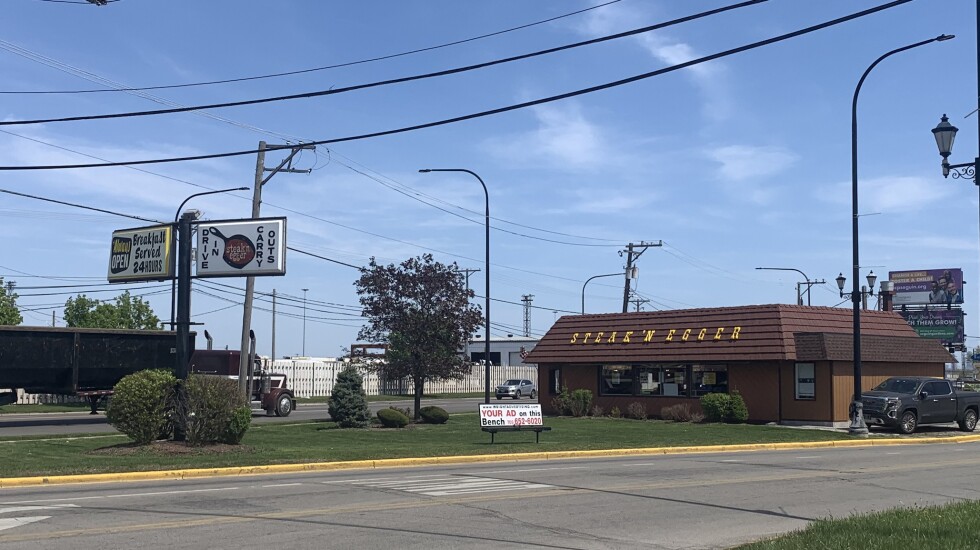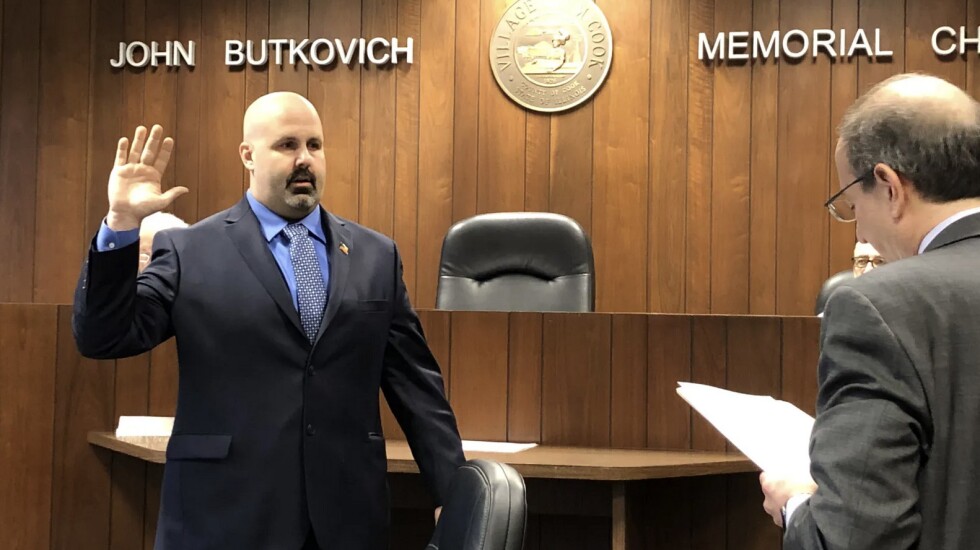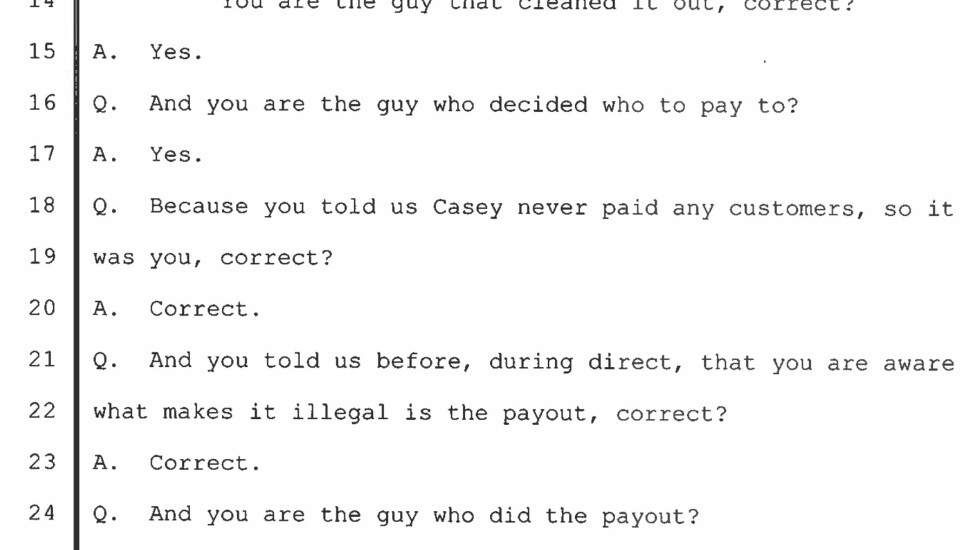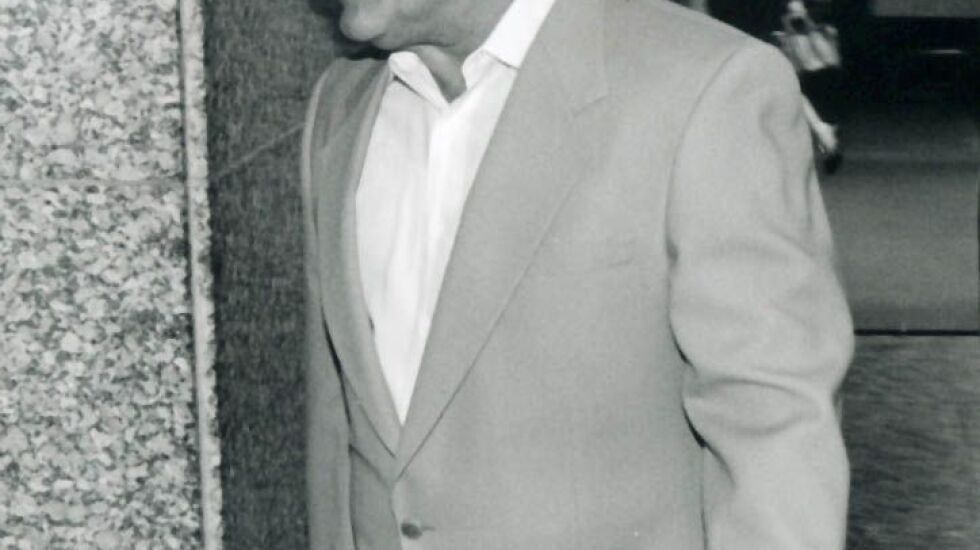
Bertucci also testified that he’d gotten other gambling machines from a different operator, Casey Szaflarski, who has been portrayed by federal authorities as the mob’s video poker king.
And Bertucci admitted he’d paid winnings to gamblers playing those devices — which at the time was illegal to do in Illinois — and shared profits with Szaflarski in a 70/30 split.
Granted immunity in exchange for his testimony against Szaflarski — in a case that also resulted in the convictions of the mob’s reputed Cicero street boss, Michael “The Large Guy” Sarno, and pawnshop owner Mark Polchan, who was a high-ranking member of the notorious Outlaws Motorcycle Club — Bertucci was asked by a prosecutor: “Why is it that you only paid out people that you knew?”
Bertucci responded, “Because it was illegal, and I didn’t want to get caught.”
Bertucci still runs the same Cicero diner, a franchise of the Steak N Egger chain that’s owned by the politically connected Carr family. And he has video gaming devices in that establishment that make payouts.
But now he does that legally. He’s licensed by the Illinois Gaming Board, and the government gets a cut.

The gaming board, which reports to Gov. J.B. Pritzker, has licensed Bertucci’s Firebird Enterprises, Inc., to legally operate video gambling machines at the diner since 2019, state records show.
Since then, the records show, six gambling devices at that Steak N Egger at 5647 W. Ogden Ave. took in a total of more than $4.3 million in bets, roughly $317,000 of that considered “net terminal income” that’s split between the establishment and the gaming company providing the machines.
During that time, the state has gotten more than $90,000 in taxes from that operation, and the town of Cicero has gotten nearly $16,000.

One of the gaming board’s key jobs is to protect the integrity of legal gambling in Illinois by weeding out unsuitable license-holders and applicants, for reasons including ties to organized crime — which has long considered illegal gambling its domain and in recent years has tried to capitalize on legalized gambling as well.
Asked how Bertucci ended up getting permission to be involved in legal gambling given his admissions, gaming board spokeswoman Elizabeth Kaufman says: “The allegations you have raised are serious, and the Illinois Gaming Board is looking into them. Please note that Mr. Bertucci submitted a video gaming license application for Firebird Enterprises, Inc. d/b/a Steak N Egger-Racine on June 28, 2018, and received licensure on Jan. 30, 2019 — all before” Marcus Fruchter, the current gaming board administrator, “or any current board member began their service” for the agency.

The gaming board “does not comment on pending, potential or active investigations or matters that are confidential under . . . the Illinois Gambling Act,” Kaufman says. “We will provide additional information when we are able to do so.”
Fruchter wouldn’t comment. Bertucci didn’t return calls.
Casinos have been allowed in Illinois for more than 30 years, but legislation legalizing video gaming didn’t come until 2009. Since it began in 2012, video gaming has mushroomed.
At the time Bertucci was granted a state gaming license, Agostino Lorenzini was the agency’s acting administrator. Lorenzini, an attorney who’s now a senior adviser with the agency, says he doesn’t recall Bertucci’s company or the vote by gaming board members to license it.
The Steak N Egger chain — which is run by McCook Mayor Terry Carr and his father, also named Terry Carr, who’s a Willow Springs village trustee — has had Bertucci as a franchise-holder for two locations for decades — the one in Cicero and one in Chicago at 1174 W. Cermak Rd. that doesn’t have video gaming, though, according to Bertucci’s 2010 testimony, it used to.

Video gaming is legal statewide, but municipalities are allowed to decide whether they want it in their communities. The city Chicago has so far opted against it, though that could change under incoming Mayor Brandon Johnson. The mayor-elect also is inheriting a plan to bring Chicago its first casino, which will need gaming board licensing.
Four other Steak N Eggers owned by the Carrs are licensed by the gaming board to offer video gaming, as is their recently opened Lucky Cindy’s in Bridgeview, records show.
Of Bertucci, Carr says, “He does not own the Steak N Egger name . . . He’s a franchise-holder. You own an apartment building, and you rent to someone; they’re in charge of what’s in the apartment.”
Carr, grandson of the late Cook County Commissioner Allan Carr, says he doesn’t share in any of the gaming profits from the Cicero location.
“I’d be the happiest man if you told me we’re splitting profits,” he says with a laugh. “He pays us rent for the restaurant, that’s it. I don’t run day-to-day operations there.”

Firebird gets its gambling devices from Accel Entertainment, whose lobbyists include a firm run by Michael Kasper, a longtime top aide to former Illinois House Speaker Michael Madigan under whose tenure video gaming was legalized.
The Carrs use Accel for their Steak N Egger in McCook, records show.
For their other locations, they use machines from Gold Rush Gaming, run by businessman Rick Heidner, whose other companies own properties that are home to some of the Carrs’ restaurants, records show.

Heidner faced problems with the gaming board several years ago, when Fruchter moved to revoke his company’s gaming license, saying he had offered a $5 million “illegal inducement” to the owner of a gambling parlor that planned to remove Heidner’s machines.
Heidner settled with the state agency, kept his license and dismissed the accusations as part of a “smear campaign” by a competitor.
One of Heidner’s other competitors is a gaming company run by Chicago zoning lawyer James J. Banks, who previously has been in business with people with reputed mob ties and who initially was denied a gambling license by the gaming board. It later reversed course and granted him one.

Banks is a founder of Belmont Bank & Trust, which, records show, holds the mortgage on a Heidner property that’s occupied by Lucky Cindy’s.
Bertucci’s 2010 testimony came in a racketeering conspiracy case that led to convictions of Sarno, Polchan and Szaflarski.
Szaflarski was Bertucci’s video gaming contact for a time, providing machines and splitting the profits, records show.

Bertucci also got gaming machines for a time from M & M Amusement, which corporate records said was headed by Michael “Mickey” Marcello, a reputed Chicago mob figure, but which was overseen by his mob boss-brother James Marcello, according to records that federal authorities made public.
Michael Marcello recently was released from federal prison after being convicted of trying to inflate his Social Security benefits. James Marcello is serving a life sentence after being convicted in the landmark mob-busting racketeering case Operation Family Secrets.

Reached through officials at the Colorado prison where he’s serving his sentence, James Marcello declined to comment.
Mile Konjevic, who was another prosecution witness at the trial of Sarno and his co-defendants, testified that he illegally paid winners from video gaming machines installed at his gas station in McCook.
After video gaming was legalized years later, Konjevic’s company tried to get licensed, but the gaming board rejected the application.







